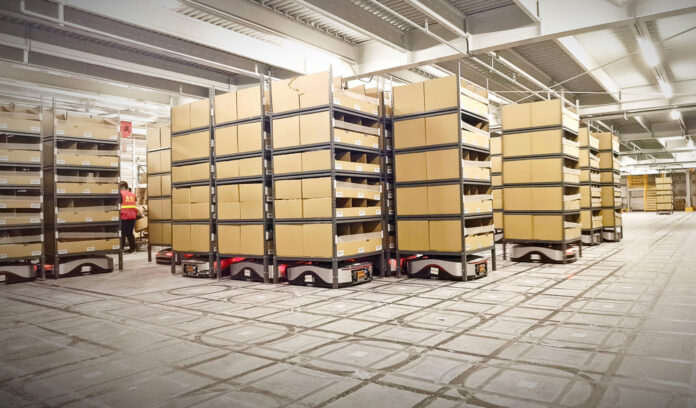JD.com, the other mega China-based online retailer, has been running at least 100 “self-developed” automated guided (or “ground”) vehicles (AGVs) over a private 5G network, apparently from local vendors Huawei and ZTE, to automate certain pick-and-pack supply chain operations at its busiest warehouse complex during the so-called ‘618’ (June 18) sales rush in China in the first half of June.
JD Logistics, its warehousing and fulfilment business, has been managing the private 5G network at a distribution centre in Changsha, in the Hunan province in southern China, billed as the company’s busiest logistics park (called “Changsha Asia No.1”) in the region. It called it an “industry-first” in a press note, of a “scaled commercial deployment of [a] private 5G smart warehouse with [support for] 100-plus AGVs”.
The 618 Grand Promotion (“618”; also known as Jingdong, and as 360buy) is a big mid-year shopping promotion in China, working like a stretched Black Friday sale. It was created by JD.com founder and chairman Richard Liu, originally as a celebration of the company’s founding (on June 18), and runs online and offline, June 1-18. The 2022 sale saw 110,000 shopping items processed by 5G-connected AGVs during a peak 24-hour sales period.
So the story goes. JD.com, on the Fortune Global 500, and a major competitor to Alibaba-run web retailer Tmall (Taobao Mall), ships over 200 million products during the period, it is claimed. The firm’s warehouse and logistics business is name-checked in press materials by both Huawei and ZTE; it was on stage at Huawei’s 5G summit in 2020, talking about its combination with telecoms suppliers to “accelerate 5G application in the logistics industry”.
5G is the “backbone” platform, it said, for AI and IoT based supply chain solutions, and a way to negate high costs, low efficiency, and low digitization to make the world’s biggest logistics economy tick faster. Its 5G-based smart warehouse deployment, developed with ZTE and others, won a prize at some 5G conference (the 2021 World 5G Conference, apparently) in 2021 – the same year as JD Logistics’s IPO in Hong Kong.
The Asia Times wrote in 2021, that “JD still depends on 200,000 delivery personnel but its warehouse management makes Amazon look primitive”. It said: “By contrast, Western companies are still evaluating whether they should install private 5G networks to support factory automation… Some German companies, including Audi and BASF, are testing private networks.”
The AGVs in its Changsha distribution centre use “in-house QR code sensing” over 5G; the new 5G network “notable performance improvement” over traditional Wi-Fi, said telecoms hardware provider AI-LINK, which is providing 5G and edge products for the JD Logistics setup. AGVs connected to private 5G were able to maintain close to zero packet loss, with connection timeout number dropping by 70 percent compared to Wi-Fi.
A spokesperson for the JD Logistics distribution centre said. “JD’s AGVs have helped increase the moving efficiency of the park by 200 percent. Private 5G is able to provide AGVs with stable and low-latency wireless connectivity, which [has] resolved the previous issue of AGV heartbeat abnormality due to higher latency with unpredictable fluctuation [from] Wi-Fi; this has profound impact on the stability of AGVs and hence their efficient operation especially during peak hours.”
A statement said: “JD Logistics is planning to expand the usage of 5G to other relevant use cases such as intelligent material handling and storage, logistics visual monitoring and trace-ability, creating an end-to-end 5G platform to further improve the total management efficiency of JD’s industrial parks. [It] will focus on more scenarios to comprehensively promote the digital transformation of its logistics business.”

